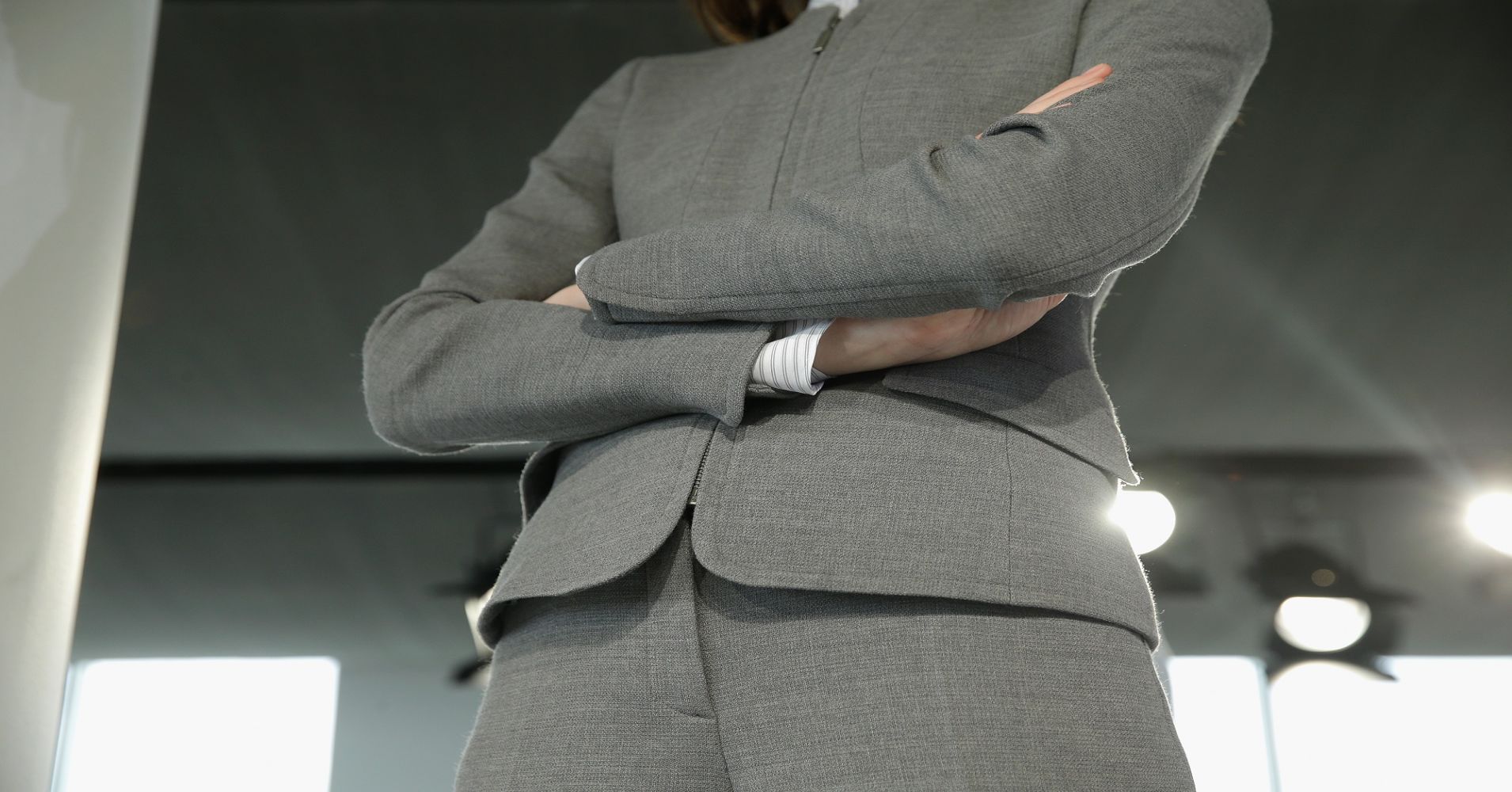
Does the colour of the clothes you wear at work matter? Could wearing a red tie or dress be the key to getting promoted?
Pennsylvania bank boss John Spier was fed up with looking like a "stuffy banker".
So after decades of wearing loose-fitting pinstripe suits and anonymous ties, he decided he wanted a fashion makeover.
Taking a leap of faith, Mr Spier enlisted the help of a corporate stylist Toi Sweeney.
Overnight his old wardrobe was binned, to be replaced with "warmer ties and a more fitted suit", says Mr Spier.
"She was able to preserve the professional look I wanted without making me seem like a stuffy banker."
Mr Spier says he went from an executive who rarely thought about what he was going to wear, to someone who likes wearing colourful ties.
More importantly, he says the makeover has put a spring in his step, and made him more confident.
The saying, "you never get a second chance to make a first impression" perhaps resonates most in the workplace, where bosses must exude authority but also friendliness, and the rest of us want to look professional, but stand out.
Ms Sweeney believes "we are all products and your personal brand steps through the door before you do".
She may have a point. According to research from Princeton University, when we see a new face, our brains decide whether a person is attractive and trustworthy within a tenth of a second.
Ms Sweeney says that the colours you wear also have a big impact on how others quickly perceive you. For example, she says red is a powerful colour that implies confidence and leadership qualities.
Whereas, blue apparently connotes a warmer approach, since "it's the colour of trust and being a peacemaker".
And black can suggest authority and sophistication, but Ms Sweeney advises that it should be mixed up with a splash of colour. She recommends a bright handkerchief in a suit pocket for men, or a colourful handbag for women, so as the person can stand out from the crowd.
Stay informed. Subscribe to our newsletter
Meanwhile, the colour brown should also not be discounted since it often suggests that the wearer is reliable. "Ever wonder why United Parcel Service workers only wear brown?" says Ms Sweeney.
Kara Kuryllowicz, a 57-year-old corporate writer based in Toronto, hired a stylist last year to help modernise her look.
"I thought everything I owned was fine, but she came to my place and went through my closet and threw out 80% of my clothes," she remembers.
Ms Kuryllowicz says she had "a long-time love affair with black and white, but now I'm wearing more colours".
"Now I'm [also] wearing more jewellery with colour, and I feel really comfortable wearing it."
Her new colourful look makes her feel more "professional and confident" and has helped her to win more work, she says.
While the cynical might question whether wearing a certain colour to work can really make a difference, a number of studies have actually shown that it can affect how we feel.
In a report published earlier this year in the European Journal of Social Psychology, participants who wore red reported feeling more physically attractive and sexually receptive than those who wore blue.
Also, in a study published in the Journal of Experimental Social Psychology, subjects who donned white coats that they thought belonged to doctors did better on tests than those who wore casual clothes, or those who thought the coats belonged to artists.
"What you're wearing affects your mood and builds your confidence. It's worth it to always dress a little better than those around you," says Toi Sweeney.
Someone who knows about dressing better, is Kim Winser, a former chief executive of the UK fashion brands Aquascutum and Pringle of Scotland.
She now runs Winser London, a luxury women's fashion label which also advises clients on what to wear in the office and for overseas meetings.
Ms Winser says that using colour is important, but doesn't override the overall need to look as smart and presentable as possible.
"Since executives are travelling more now than ever, they want to ensure they can make a great first impression in front of clients and colleagues when they don't have their full wardrobe with them," says Ms Winser.
She also stresses the importance of polishing your shoes, especially before a job interview.
"I know many interviewers who say they first look at someone's shoes, if they're scruffy or clean," she says.
Though once your shoes are in good shape, she cautions there shouldn't be a hard-and-fast rule when it comes to what to wear.
Instead your fashion voice will be determined by your position and company. A start-up in California will have a different dress code than a law firm in Paris, for example.
"Remember, you are signing up to champion your company's cause as well as your own," she says.
 The Standard Group Plc is a
multi-media organization with investments in media platforms spanning newspaper
print operations, television, radio broadcasting, digital and online services. The
Standard Group is recognized as a leading multi-media house in Kenya with a key
influence in matters of national and international interest.
The Standard Group Plc is a
multi-media organization with investments in media platforms spanning newspaper
print operations, television, radio broadcasting, digital and online services. The
Standard Group is recognized as a leading multi-media house in Kenya with a key
influence in matters of national and international interest.
 The Standard Group Plc is a
multi-media organization with investments in media platforms spanning newspaper
print operations, television, radio broadcasting, digital and online services. The
Standard Group is recognized as a leading multi-media house in Kenya with a key
influence in matters of national and international interest.
The Standard Group Plc is a
multi-media organization with investments in media platforms spanning newspaper
print operations, television, radio broadcasting, digital and online services. The
Standard Group is recognized as a leading multi-media house in Kenya with a key
influence in matters of national and international interest.










